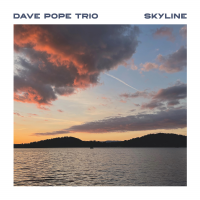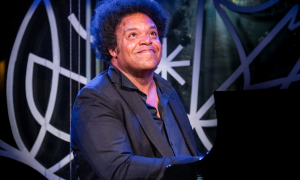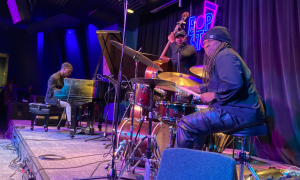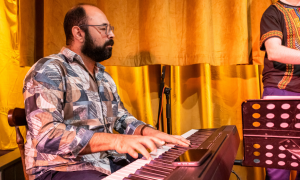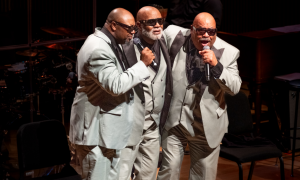Home » Jazz Articles » Live Review » Billy Test: Solo Piano at The Kitano
Billy Test: Solo Piano at The Kitano
The Kitano
New York, NY
March 13, 2012
Solo piano is a format that acts as a statement of achievement as much as it is a stylistic choice. It's not a venture for the half-hearted; solo piano concerts are typically conducted by longstanding luminaries like

Keith Jarrett
pianob.1945

Brad Mehldau
pianob.1970

Mulgrew Miller
piano1955 - 2013

Harold Mabern
piano1936 - 2019

Armen Donelian
pianob.1950

Bill Goodwin
drumsb.1942

Steve LaSpina
bassb.1954

Linda May Han Oh
bass, acousticb.1984

Fred Hersch
pianob.1955

Marc Mommaas
saxophone, tenorb.1969

Ethan Iverson
pianob.1973

Aaron Parks
drumsb.1983

Barry Harris
piano1929 - 2021
Test's three-set performance wasn't just an example of what he was capable of doing, but a reminder of what the solo piano format is capable of achieving. Within the first tune, he was already exhibiting tried-and-true executions of moving block chords, skating lines, dissonant clusters and flashes of pianistic brilliance. Test's classical influence was not a means to a technical end but an active participant in his improvisations. Many of his bass lines moved with a sharp, contrapuntal quality; in his interpretation of

George Shearing
piano1919 - 2011
One of the constant elements throughout his performance was its collection of

Thelonious Monk
piano1917 - 1982
In spite his young age, Test has chosen to be a part-time gatekeeper of semi-obscure standards that other pianists might have passed by. His renditions of Green/Comden's "Lucky to be Me" and Jerome Kern's "Nobody Else But Me" were touched with a healthy respect of their melodies and inherent romanticism but also given some modernistic kicks. Alec Wilder and Morty Palitz's "While We're Young" started out with affectionate echoes of the melody in the upper register before he ran into fleet bebop lines that coalesced into extended polyrhythms. Test gave a unique, introspective look into Leonard Bernstein's increasingly standardized "Somewhere" with wistful, oblique intro that vacillated between charm and dramatic serialism, but kept the enduring strains of the melody present at all times, even during his solos.
Without the support of bass or percussion, to be rhythmically and/or harmonically inventive in the solo piano requires confidence, but with Test at the helm, it was an outright statement of bravery. Test adhered to polyrhythms with such determination that the "true" meter didn't surface for sections at a time. During his own "Samba do Choro" (a contrafact of another old standard, "This Heart of Mine"), he was challenged to keep the Brazilian rhythms without the help of percussion. Not only did he succeed, but also didn't lose any of "himself" either, keeping all of the long bop lines and crunchy intervals in tow. His harmonic concept was even more adventurous. His blues selections got heavy doses of what went beyond "outside playing" and into the realms of "live reharmonization." Four bars of his solo on his own "Blues for Farnham" even channeled a little

Cecil Taylor
piano1929 - 2018
Above all else, Test was absolutely committed in pushing himself further and further within the context of his own performance. His use of the extreme registers of the piano was a testament to his touch; he transformed what are usually annoyingly metallic high notes into music box tines and groaning low notes into true bass counterpoint. Harmony-wise, "Speak Low" in particular found the pianist extracting dizzying colors and textures from every angle, setting up patterns that seemed to defy time and harmony and reaching out from there. His constant push had another angle, however, as he also pushed himself to become more swinging. His blues selections, in particular, had the effect of reaching to a fever pitch, each 12 bars getting increasingly abstract until he switched gears and aimed for more bluesiness, more groove and more joyous bounce. It's rare to find a pianist whose growth can be traced over a few months; Test's musical growth was witnessed in a few hours. It's a positive thing to discover, because most musicians can give the assurance that they are already amazing. Billy Test, however, can give the cast-iron guarantee that by tomorrow, he'll be even better.
Tags
Billy Test
Live Reviews
Daniel Lehner
United States
Keith Jarrett
brad mehldau
Mulgrew Miller
Harold Mabern
Armen Donelian
Bill Goodwin
Steve LaSpina
Linda Oh
Fred Hersch
Marc Mommaas
Ethan Iverson
Aaron Parks
Barry Harris
George Shearing
Thelonious Monk
Cecil Taylor
Comments
PREVIOUS / NEXT
Support All About Jazz
 All About Jazz has been a pillar of jazz since 1995, championing it as an art form and, more importantly, supporting the musicians who make it. Our enduring commitment has made "AAJ" one of the most culturally important websites of its kind, read by hundreds of thousands of fans, musicians and industry figures every month.
All About Jazz has been a pillar of jazz since 1995, championing it as an art form and, more importantly, supporting the musicians who make it. Our enduring commitment has made "AAJ" one of the most culturally important websites of its kind, read by hundreds of thousands of fans, musicians and industry figures every month.


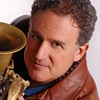


 Buy Now
Buy Now



